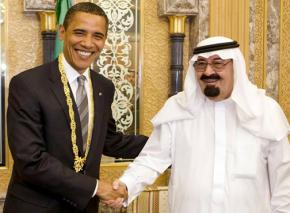What’s another beheading among allies?
Western leaders have protected the Saudi elite from scrutiny or sanction for half a century, explains Irish Times columnist .
THE ATROCITY in Paris on November 13 blew away some of the gloom which had settled on a number of major companies, at least for a short time.
In the first 30 minutes of trading after the New York Stock Exchange opened three days later, shares in the five biggest U.S. arms manufacturers jumped: Lockheed Martin by 3.5 percent, Raytheon by 4.1 percent, Northrop Grumman by 4.4 percent, General Dynamics by 1.9 percent and Boeing by 1.3 percent.
Hardly dramatic but, coming after three years of decline, enough to put a smile back on stockholders' faces.
The winding-down of U.S. military operations in Afghanistan and Iraq and defense spending cutbacks in cash-strapped Western economies had depressed demand. Post-Paris, brighter prospects beckoned.
Financial services group Stifle told clients: "We view the most likely outcome as increased political support for defense spending and for national security/terrorism to become a greater focus of the 2016 election-cycle dialogue, which is likely to create positive headlines for defense companies."

Seen in this perspective, the aftermath of the beheading of the Shia cleric Nimr al-Nimr and 46 others by Saudi Arabia can seem part of a positive trend.
Many may be worried sick about the possibility of war between Saudi Arabia and Iran spiraling outwards to engulf the region, or feel dismayed that notions of human rights appear to have been discarded on all sides.
But in the counting houses of capitalism, market conditions matter more. The rattling of sabers rings up higher sales.
PROTECTING THE Saudi elite from scrutiny or sanction has been an economic and therefore a political imperative for western leaders for half a century.
The most egregious example concerns the Bush administration's role in spiriting more than 100 prominent Saudis, including at least 30 members of the extended bin Laden family, out of the U.S. in the immediate aftermath of the 9/11 massacre.
Private jets authorized by the White House zipped hither and thither to pick up groups of Saudis from 10 regional airports.
Bush's security chief, Richard Clark, would tell Vanity Fair the FBI had given each a clean bill of health.
But the bureau's former head of counterterrorism, Dale Watson, told the magazine the departing Saudis "were not subject to serious interviews or interrogations."
New York Democratic Sen. Charles Schumer said, "It's almost as if we didn't want to find out what links existed."
During the Arab Spring, in February 2011, 200,000 Bahrainis occupied the Pearl Roundabout in the capital, Manama. Posters proclaimed them as Sunnis and Shias standing together.
Saudi King Abdullah wasn't going to have that sort of thing. Tanks rolled across the border. About 40 demonstrators were killed. Thousands were thrown into prison. The democracy movement was crushed.
No resolution to the UN Security Council resulted. Bahrainis yearning for dignity counted for nothing compared to a dictatorship exporting terrorism for years.
Abdullah died a year ago. His funeral saw formation kowtowing which would have done credit to an Olympic opening ceremony.
Barack Obama headed a delegation seemingly comprising the entire U.S. government. David Cameron recalled Abdullah's "warmth." Hillary and Bill Clinton referred to "a "family friend."
François Hollande, Recep Tayyip Erdogan, Prince Charles, Felipe VI, Crown Prince Frederik, Pakistani Prime Minister Nawaz Sharif and scores of other leaders joined in the lamentation.
Christine Lagarde, head of the International Monetary Fund, described Abdullah as "a strong believer" in women's rights.
U.S. Secretary of State John Kerry said: "The U.S. has lost a friend. The world has lost a revered leader."
IN GENEVA in September, the UN Human Rights Council heard testimony of the results of Saudi-led bombing in Yemen.
Tank, artillery and air attacks had created what the UN described as "one of the world's worst humanitarian disasters."
Thousands perished. Eighty percent of the country's 25 million people were "on the brink of famine."
The New York Times reported: "Errant coalition strikes have ripped through markets, apartment buildings and refugee camps."
Photographs showed "shredded bodies, some incinerated beyond recognition."
In Washington the same month, Abdullah's successor met Obama and Kerry. King Salman wanted reassurance the Iran nuclear deal didn't mean America's ardor was waning.
Kerry gave reassurance: "We are determined that our Gulf friends will have the political and military support that they need."
It was reported the following day the Pentagon was finalizing a billion-dollar deal to supply the Saudis with weapons for use against Islamic State and "the Houthi rebel movement in Yemen."
After all, among friends, what matter a bit of beheading?
First published at the Irish Times.


